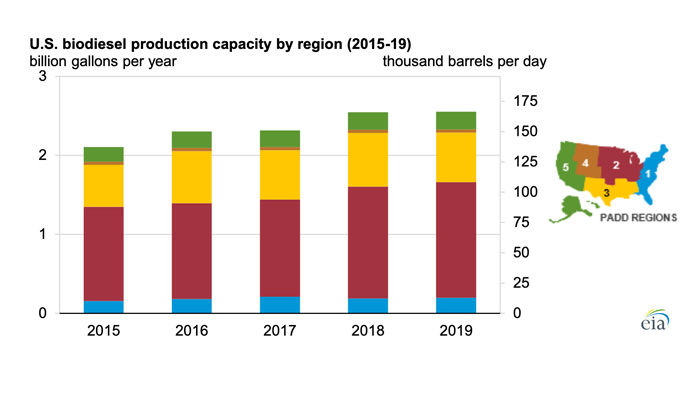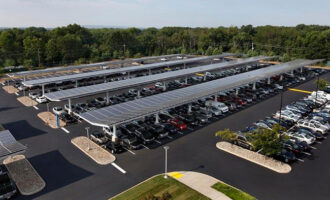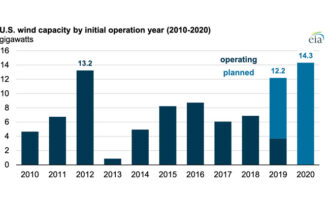
EIA releases first annual U.S. biodiesel production capacity report
The 2019 U.S. Biodiesel Plant Production Capacity Report, the first-ever published by the U.S. Energy Information Administration (EIA), shows 102 operating biodiesel plants with 2.6 billion gallons (gal)/year in biodiesel production capacity, or 167,000 barrels per day (b/d).
More than half of the nation’s biodiesel production capacity is in the Midwest (PADD 2) region, led by states such as Iowa, Missouri, and Illinois. Of the top 15 biodiesel-producing states, nine are located in the Midwest.
The report includes the total biodiesel production capacity for all operating plants in both million gallons per year and barrels per day as of 1 January 2019. Like the Ethanol Plant Production Capacity Report, EIA plans to update the report annually.
U.S. production of biodiesel reached 1.8 billion gallons (119,000 b/d) in 2018, implying a 72% utilization rate based on the nameplate capacity level recorded at the beginning of 2018. In its latest Short-Term Energy Outlook (STEO), EIA forecasts that U.S. production of biodiesel will reach about 2.0 billion gallons (128,000 b/d) in 2019, resulting in 77% utilization of reported nameplate capacity as of 1 January 2019.
Respondents report the biodiesel production capacity data to EIA on Form EIA-22M, Monthly Biodiesel Production Survey, and EIA publishes the data in the Monthly Biodiesel Production Report. All entities that produce biodiesel that meets ASTM D 6751-07B specifications and is used for commercial purposes within the United States submit Form EIA-22M. Additional data collected on Form EIA-22M include production, sales, stock changes, and feedstock inputs to production.
Annual production capacity refers to the volume of fuel that can be produced in a calendar year under normal operating conditions, assuming normal downtime for maintenance. Reported production capacity totals include all active plants, which includes those that are temporarily inactive.
Active plants are those plants that have produced or sold biodiesel during the reporting month. Temporarily inactive plants are those plants that have not produced or sold biodiesel during the reporting month but have not permanently ceased operations. Plants may report as temporarily inactive when they are down for maintenance or idled during times of low operating margins.









